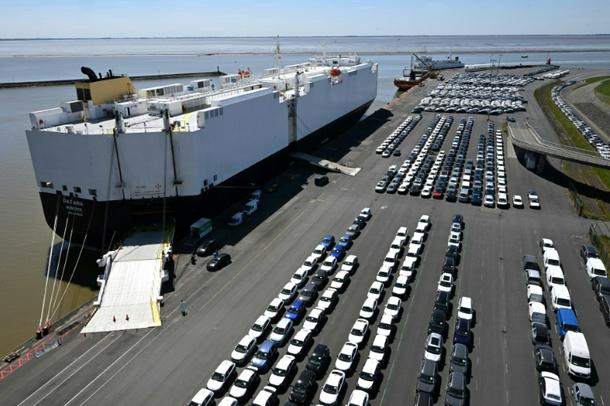
Volkswagen cars waiting last month to be put aboard a ship for export near the company's factory in Emden, northwestern Germany
Frankfurt (Germany) (AFP) - Germany could face two more years of recession if a trade war with the United States escalates sharply, the central bank said Friday, a bleak warning for Europe’s struggling top economy.
If US President Donald Trump’s tariffs were implemented in full from July and the EU retaliated, then German output would decline 0.5 percent this year and 0.2 percent in 2026, the Bundesbank forecast.
This would be due to a “marked decline in exports and significant uncertainty weighing on investment”, it said.
There would be a return to growth in 2027, with a rebound of one percent, it said.
The eurozone’s traditional growth engine has already contracted for the past two years due to a manufacturing slump and surging energy prices after Russia invaded Ukraine, but hopes had been high for a modest recovery from this year.
When Trump unveiled his “Liberation Day” tariffs in early April, he threatened to hit the European Union with a 20-percent levy over its hefty surplus in goods traded with the United States.
He then paused those higher rates until July to allow for talks to try to reach a deal. More recently he said he would slap the EU with a 50-percent tariff rate as negotiations stalled – but has also delayed that measure.
The bloc still faces a “baseline” 10-percent tariff rate on all its exports to the United States, as well as higher levies on some specific sectors.
- Risk to German exports -
Trump’s tariff blitz stands to hit export power Germany hard, as the United States was Germany’s top trading partner in 2024, receiving huge quantities of its cars, pharmaceuticals and machinery.
Germany’s federal employment agency predicted that, in the event that 25-percent tariffs were imposed, it would cost the country about 90,000 jobs in a year, the Sueddeutsche Zeitung daily reported.
“The erratic trade policy of the United States is putting pressure on the German labour market,” agency chief Andrea Nahles told the newspaper.
“The problem is this lack of predictability, which is causing us massive damage. It is preventing companies from investing, hiring and training people.”
As well as a worst-case scenario, the Bundesbank also released “baseline” growth projections.
This envisages US trade policy having a more moderate impact on Germany as new Chancellor Friedrich Merz’s planned spending surge on infrastructure and defence helps support the economy.
Under these forecasts, the economy would stagnate this year before expanding 0.7 percent in 2026 and then 1.2 percent in 2027.
The German government and many economic institutes have already slashed their growth forecasts for this year to zero, citing the uncertainty triggered by Trump’s trade war.